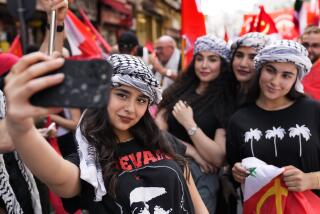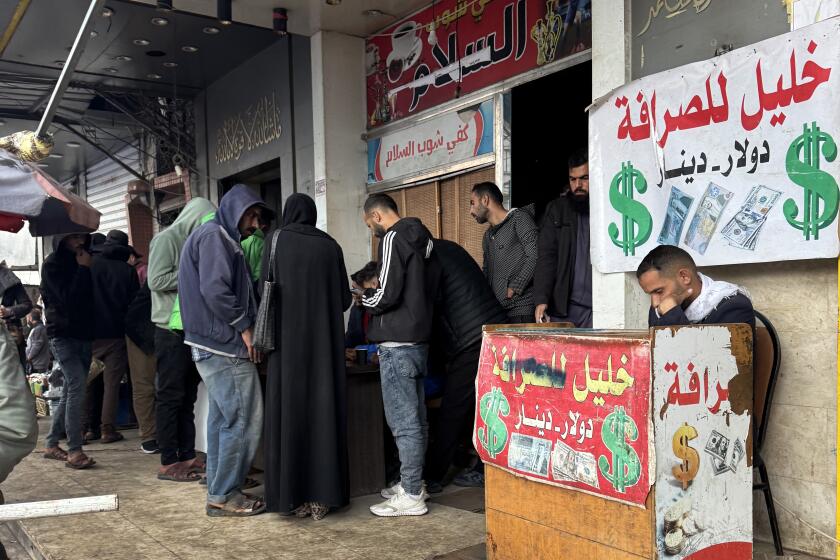No Hoopla on a Sullen Moscow May Day : Soviet Union: The speeches are uninspiring and the slogans predictable. And Gorbachev says nothing. Many officials are absent.
- Share via
MOSCOW — For an hour on Wednesday, about 50,000 workers stood in Red Square in the heart of the Soviet capital in nominal celebration of May Day, the holiday of the international labor movement. When the half a dozen speeches were over, they left.
And there is little more to be said of May Day, 1991, in Moscow.
The old hoopla was gone--no carefully orchestrated gymnastics, no elaborate floats depicting the products of Moscow’s leading factories, no expressions of solidarity with the revolutions under way around the world.
The workers were sullen, the speeches uninspiring, the slogans predictable. Mikhail S. Gorbachev, who was introduced as the country’s president rather than the general secretary of the Communist Party, said nothing. Almost all of the other political leaders were absent for the first time.
For decades, May Day had been one of those points on the political compass by which the country oriented itself. When a member of the Communist Party’s ruling Politburo was ousted, his icon-like portrait was removed from the parade. When the political line shifted, the slogans changed. Even the lineup on Vladimir I. Lenin’s Mausoleum was studied, to see who stood closest to the top leader.
In those terms, the May Day observance on Wednesday indicated a country adrift.
Even more than in the past, the workers were dragooned into participation. The word went out: The levy on each factory and office would be smaller this year, but the people had to be trustworthy.
To avoid the embarrassment of last year--when workers shouted insults and drove Gorbachev and other leaders from atop the mausoleum--participation was cut by more than two-thirds from the 150,000 or 200,000 of recent years.
And police surveillance was tightened at Red Square so that there may have been a police officer, soldier or KGB security agent for every two or three workers.
“Unity” and “solidarity” were the key words in the speeches and the slogans, but the questions of “For what?” and “Against whom?” went unanswered.
The sharp increases last month in the prices of food and consumer goods were criticized, as was Gorbachev’s new 5% sales tax, and compensation was demanded through the indexing of wages.
“The working people today demand that the breakup of the state be halted and the economy be brought to order so that people will have the opportunity to work and earn a decent salary,” Vladimir Shcherbakov, chairman of the Soviet Confederation of Trade Unions, told the rally. “It’s time that all who are vested with power be held to account.”
But no one was prepared to address the impending selloff of state enterprises--some to their managers and staff but others to private entrepreneurs or foreign investors--and the large-scale unemployment that will result as the new owners attempt to increase productivity.
Nor was there any effort to raise the other major economic questions that face the country as it moves from a centrally planned to a market-dominated economy.
“People do not understand what is happening. There is no war, no drought, no epidemic, no calamities, but we are talking about hunger,” Shcherbakov said. “The half-measures taken by the government aggravate the crisis and hit the rank-and-file people the most.”
Mikhail Shmakov, chairman of the Moscow Federation of Trade Unions, said the demonstration shows “the force and organization of the union movement, its readiness to defend ourselves and our families from uncontrolled price increases and thoughtless management decisions.
“We are against a sharp rise in prices without (wage) indexation,” he said. “We are against the 5% tax.”
Yet, neither Shcherbakov nor Shmakov had any proposals to counter the government’s latest plan for economic stabilization, and the unions resorted to the blandest of slogans, avoiding any suggestion that socialism would bring a brighter future.
“Unity Is Our Strength,” many of the banners read.
In Leningrad, the demonstration was cut back to 20,000 and kept to less than an hour. In the Ukrainian capital of Kiev, only 7,000 took part, according to the independent news agency Interfax; several times that number gathered later for a nationalist rally. In the Ukrainian mining center of Donetsk, the demonstration lasted only 20 minutes, Interfax reported.
BACKGROUND
May Day is celebrated as a spring festival in many countries. Its origin is lost in antiquity, traceable back to the Romans or the Druids. But in 1889, it was taken over by Socialist and Communist countries when the Second Socialist International, meeting in Paris, voted to support the U.S. labor movement’s demands for an eight-hour day by declaring May 1 a holiday to honor working people.
More to Read
Sign up for Essential California
The most important California stories and recommendations in your inbox every morning.
You may occasionally receive promotional content from the Los Angeles Times.










